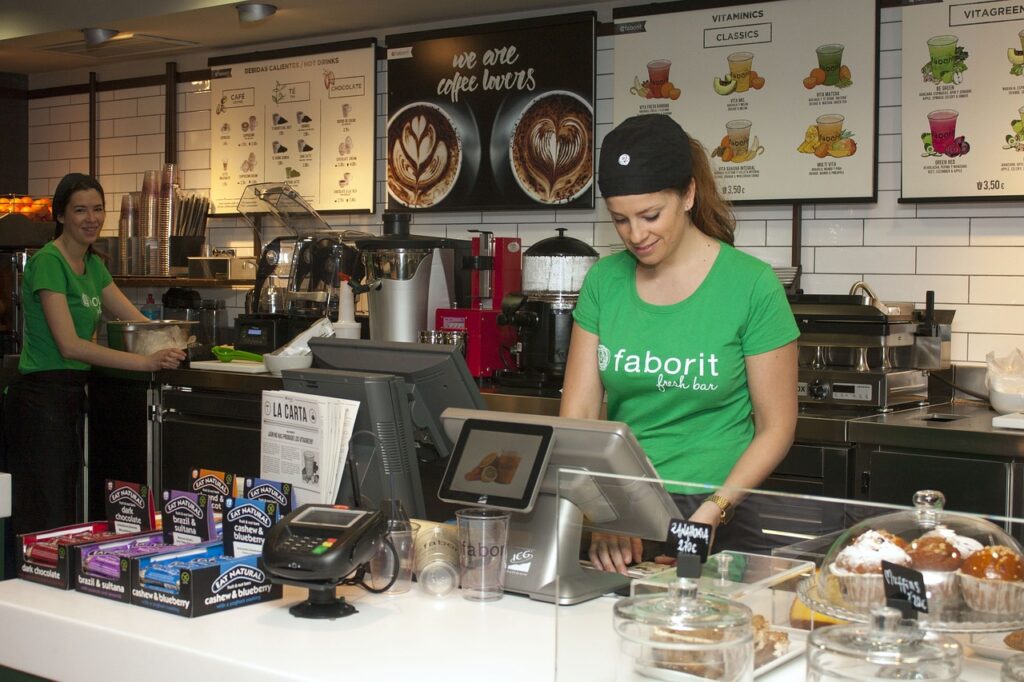When you’re at the threshold of entrepreneurship, the decision between purchasing a franchise and starting your own business is pivotal. Each route offers distinct advantages and potential drawbacks. In this discussion, we unravel the pros and cons of buying a franchise as opposed to launching a start-up, helping you make a more informed decision.
 Pin
Pin Image by Alterio Felines from Pixabay
Table of Contents
The Franchising Path: A Look at the Pros
Structured Guidance: Franchises present a blueprint for success. Leveraging established brands, tried-and-tested methods, and ongoing support, franchisees can dive in with a comprehensive roadmap.
Brand Recognition: With a franchise, you capitalize on existing brand awareness. Customers are often familiar with the product or service, reducing the investment (both time and money) needed to build a customer base.
Training Resources: Franchisors typically provide extensive training programs, ensuring you run the franchise effectively, which is a significant advantage for new business owners without prior experience.
The Flip Side: Franchise Cons
Initial Investment: Franchise fees can be steep, including initial investment and ongoing royalties, which can eat into profits.
Operational Restrictions: Franchisees adhere to the franchisor’s rules, which can limit creativity and personal input on business operations.
Renewal and Termination Terms: Your continuation as a franchise owner can hinge on the franchisor’s terms, which might impact long-term business security.
The Start-Up Route: Embracing Autonomy
Creativity and Innovation: Starting your own business means freedom to innovate, create your brand, and establish business processes that reflect your values and entrepreneurial vision.
Financial Flexibility: Without franchise fees, you retain more control over your finances. Your success directly benefits you, and any expansion doesn’t require additional fees to a franchisor.
Personal Growth: The start-up journey offers immense learning opportunities, from business planning to scaling up—all based on personal decisions without predefined templates.
Facing the Challenges: Start-Up Cons
Brand Building: Establishing a new brand requires significant effort and resources. Unlike a franchise, you start from scratch, building customer trust and recognition.
Higher Risk: Without the safety net of a proven business model, start-ups face higher risk. The uncertainty of market acceptance can be daunting.
Resource Intensity: You are responsible for every aspect of the business. This means you need to be ready to handle marketing, operations, HR, and more—or have the funds to hire professionals.
Your Decision: Franchise or Freedom?
Taking the franchise route means buying into a system with ongoing support, but this comes with less freedom and potential ongoing costs that can impact profitability. On the other hand, starting your own business offers complete control over your venture, with all the risks and opportunities that entrepreneurial freedom brings.
Before making a choice, consider your entrepreneurial style, tolerance for risk, and the type of business experience you’re seeking. Whether you choose the structured support of a franchise or the autonomy of a start-up, your journey in entrepreneurship will be a dynamic adventure that requires dedication, passion, and resilience.
Are you ready to take on the challenge of buying a franchise or would you rather experience the freedom—and the potential risk—of starting your own venture? Weighing the pros and cons of each path can guide you to the decision that best aligns with your business goals and personal aspirations.
Buying a franchise involves several costs, which can be generally categorized into initial fees, ongoing fees, and other potential costs
1. Initial Franchise Fee: This is the upfront cost for the rights to open and operate a franchise business. This fee can range widely from a few thousand dollars to several hundred thousand dollars, depending on the brand and its popularity.
2. Startup Costs: Beyond the initial fee, there are numerous startup costs. These can include:
- Leasehold improvements or real estate purchases.
- Equipment, signage, and inventory.
- Licenses and permits.
- Initial marketing and opening event promotions.
- Operating capital to cover the business until it becomes profitable.
- Training fees for you and possibly your staff.
3. Ongoing Royalty Fees: Many franchises charge a monthly royalty fee based on a percentage of gross sales to provide continuous support and allow usage of the franchisor’s trademarks and systems.
4. Advertising Fees: Franchisees often contribute to a national or regional advertising fund. This fee is also usually based on a percentage of gross sales.
5. Renewal Fees: When a franchise agreement term ends, you might have to pay a fee to renew it if you want to continue operating the business.
6. Product or Service Fees: Some franchises require franchisees to buy certain products or services directly from the franchisor or approved vendors.
7. Technology Fees: To stay up-to-date with the franchisor’s recommended or required software and hardware, you may need to make ongoing technology investments.
8. Transfer Fees: If you sell your franchise, you typically must pay a fee to transfer the franchise agreement to the new owner.
9. Training: Additional or ongoing training may have associated costs, especially if travel is required.
10. Miscellaneous Fees: These might include audit fees, insurance, and legal fees.
The total cost can therefore vary considerably depending on the industry and specific franchise. It’s essential for potential franchisees to carefully review the Franchise Disclosure Document (FDD), which provides detailed information about all fees and costs, talk to existing franchisees, consult with a franchise attorney or advisor, and consider the total investment against their financial resources and business goals.
Choosing between a franchise and starting your own business depends on various factors
When to Consider a Franchise:
- Brand Recognition: If you want immediate recognition, a franchise offers an established brand.
- Proven System: Franchises come with a proven business model, which reduces the risk of failure.
- Support: Ongoing support in management, training, marketing, and operations can be invaluable, especially for new entrepreneurs.
- Easier Financing: Banks might be more willing to lend to franchises with a good track record.
- Network: You become part of a network of franchisees who can provide advice and support.
Choose a franchise when you prefer a structured environment with predefined rules, and are willing to trade off some autonomy for reduced risk and ongoing support.
When to Consider Your Own Business:
- Freedom: You have full control over all decisions, branding, and operations, tailoring the business to your vision.
- Innovation: Starting your own business allows for creativity and the ability to pivot easily in response to market demands.
- Costs: There’s no franchising fee, ongoing royalties, or mandatory contributions to advertising funds.
- Profit Potential: While riskier, the financial rewards aren’t shared with a franchisor, potentially yielding a higher profit margin.
- Personal Brand: If you have a unique business idea and want to build your own brand from the ground up, starting your own business allows for that legacy.
Opt for starting your own business when you have a unique business idea, crave independence in decision making, and are willing to take on the risks and challenges associated with entrepreneurship.
Opt for franchising if you want a “business in a box” with guidance and support at the cost of some autonomy and ongoing fees. Consider your own business if you value control, creativity, and the possibility of higher individual rewards, while bearing all the risks and responsibilities of building and managing a business from the ground up. Assess your risk tolerance, business acumen, and long-term goals to inform your decision.
Starting your own business can indeed involve significant risks, but careful planning and consideration can mitigate them. Here's what you can do to manage the risks
1. Market Research: Conduct thorough market analysis to validate your business idea. Understand the needs of your potential customers and how your product or service will meet those needs.
2. Business Plan: Develop a robust business plan that outlines your value proposition, target market, competitive analysis, marketing strategies, operational plan, and financial projections.
3. Start Small: Consider starting on a small scale or testing your concept with a minimum viable product (MVP). This allows you to gather feedback and make adjustments without overcommitting resources.
4. Financial Management: Be realistic about your start-up costs and ongoing expenses. Secure sufficient funding, and keep business expenses separate from personal finances. Monitor cash flow closely.
5. Legal Protections: Ensure you have the appropriate legal structure for your business to protect personal assets and understand your regulatory environment to ensure compliance.
6. Insurance: Get adequate insurance to protect against unforeseen events. Types of insurance to consider include general liability, product liability, professional liability, and property insurance.
7. Diversify: As your business grows, look for opportunities to diversify your product offerings or services to mitigate the impact of market fluctuations.
8. Networking: Build a strong network to provide support, advice, and potential business opportunities. This could include mentors who can offer guidance based on experience.
9. Adaptability: Be prepared to change and adapt your business model to the changing needs of your customers or shifts in the marketplace.
10. Failure as Learning: View failures as a learning opportunity. Not every decision will be the right one, but missteps can provide invaluable insights for future success.
11. Continued Learning: Stay informed about your industry, new technologies, and business skills. Knowledge can significantly reduce risk.
12. Emergency Fund: Create an emergency fund to deal with unexpected hardships in a way that doesn’t jeopardize your business operations.
Approach risk as a component to manage rather than a barrier to avoid. With these steps, while you cannot eliminate all risks, you’ll increase your chances for success and be better prepared for the challenges of entrepreneurship. Remember, every successful business owner has faced and managed risks—it’s a natural part of the journey.
Franchisees often face challenges related to creative control, stemming from the franchise model itself. Here are some common issues:
1. Brand Consistency: Franchisees must adhere to strict guidelines to ensure brand uniformity. This means there’s little room for adapting the product or service to local tastes or injecting personal flair.
2. Marketing and Advertising: Franchisors often retain control over marketing campaigns and strategies, which can frustrate franchisees seeking to implement local marketing initiatives or adapt strategies to their specific market.
3. Suppliers and Products: Franchisees are typically required to purchase supplies from approved vendors, limiting the ability to source local or alternative products that could differentiate their offering or potentially reduce costs.
4. Interior Design and Layout: Store design and layout are usually standardized, which restricts a franchisee’s ability to modify the physical space to make it more appealing to local demographics or personal taste.
5. Service Offerings: There is limited flexibility in altering or expanding the range of services or products offered at a franchise, which can be challenging when local demand fluctuates or competitors offer more.
6. Operational Procedures: Day-to-day operational procedures are mandated by the franchisor, meaning that even if a franchisee believes there is a more efficient or customer-friendly way of running the business, they may not be able to implement changes.
For many potential business owners, these limitations need to be balanced against the benefits of operating under a recognized brand with an established business model.
The essential types of insurance to consider for your business
1. General Liability Insurance: Protects against financial loss as a result of bodily injury, property damage, medical expenses, libel, slander, defending lawsuits, and settlement bonds or judgments.
2. Professional Liability Insurance (Errors & Omissions): Covers negligent professional services, including bad advice or misrepresentation.
3. Property Insurance: Covers loss and damage to company property due to fires, storms, theft, and vandalism.
4. Workers’ Compensation Insurance: Offers benefits to employees suffering work-related injuries or diseases.
5. Product Liability Insurance: For businesses that manufacture, wholesale, distribute, or retail a product, this covers financial loss as a result of a defective product that causes injury or bodily harm.
6. Business Interruption Insurance: Compensates for lost income and expenses during events that cause a disruption to the normal course of business.
7. Commercial Auto Insurance: Provides coverage for vehicles owned by your business.
8. Cyber Liability Insurance: Protects against losses due to data breaches or attacks on computer systems.
9. Directors and Officers Insurance: Protects the personal assets of corporate directors and officers in the event they are sued for wrongful acts while managing a company.
10. Employment Practices Liability Insurance: Covers wrongful acts arising from the employment process, such as wrongful termination, discrimination, sexual harassment, and retaliation.
Your specific needs depend on the type of business, its location, number of employees, and various risk factors. It’s best to consult with an insurance broker or agent who specializes in commercial policies to tailor coverage to your particular circumstances.
Testing your product with a small group
1. Feedback: Early users can provide critical feedback on your product’s appeal, usability, and functionality.
2. Improvements: You can identify and fix issues before wider release, reducing the risk of negative market reception.
3. Market Validation: You’ll gather evidence on whether there’s a demand for your product, which helps in refining your value proposition.
4. Cost-Efficient: Testing on a small scale is typically less expensive than launching to the masses, allowing you to manage your budget effectively.
5. Building a User Base: Early adopters can become loyal customers and champions of your product, spreading word-of-mouth recommendations.
6. Learning Opportunities: The process provides a real-world learning environment for your sales, marketing, and support teams.
7. Manage Expectations: You can set realistic goals for full launch based on the test’s performance.
Before you start, ensure you have a mechanism in place to gather, analyze, and act on the feedback you’ll receive. Remember, the goal is not just to identify what’s working, but also to uncover what needs to be improved.
FAQs: Franchise vs. Freedom – Buying a Franchise vs. Launching a Start-Up
Buying a franchise offers the advantage of a turnkey business operation with an established brand, customer base, and proven business model. You also receive support from the franchisor in terms of training, marketing, and operational systems. This can reduce the level of risk and uncertainty compared to starting a business from scratch.
Starting your own business provides the freedom to create and grow a brand and business model based on your own vision and values. It often allows for greater creative control, flexibility in business decisions, and the potential for higher profit margins since there are no royalty fees owed to a franchisor.
With a franchise, you’ll typically have a higher initial investment due to franchise fees, royalty payments, and adherence to their established business systems. A start-up may require less upfront cost, but unpredictable expenses can arise without a structured system in place.
A franchise comes with a built-in customer base and recognized brand, which can lower the risk. However, market saturation or negative press from other franchisees can affect you. A start-up poses higher risks due to unknown brand and untested market, but also potentially offers greater rewards.
Franchises usually come with brand guidelines and operational procedures, which can limit creativity. However, franchisees often have the ability to make localized decisions. In your own start-up, you have the freedom to innovate without such restrictions.
Franchisors provide ongoing support, training, and resources, but also enforce brand consistency and quality across the franchise network. This means they have a significant say in operations, products/services offered, and marketing strategies.
Franchises may find it easier to secure financing due to their proven business models and the franchisor’s reputation. Banks and investors often see franchises as less risky. Start-ups might face greater scrutiny and require more robust business plans to obtain funding.
Franchises can offer strong growth potential within the franchise system constraints, including the opportunity to own multiple units. Start-ups can scale at the owner’s pace and direction, possibly pivoting and adapting quicker to market changes.
You can expect pre-opening support such as site selection, design, and training, as well as ongoing support in the form of marketing campaigns, operational guidance, and a network of fellow franchisees.
Many franchisors offer territory exclusivity, but the size and scope can vary greatly. It’s essential to have these details outlined in your franchise agreement to prevent future conflicts with the franchisor or other franchisees.































